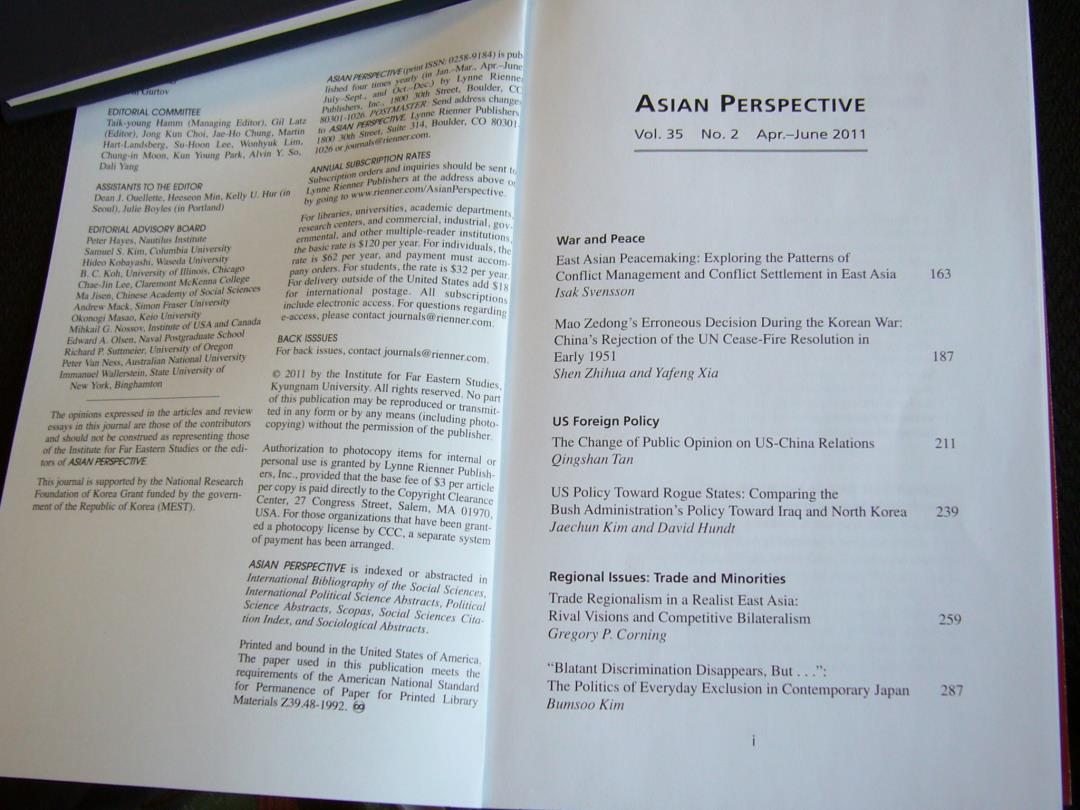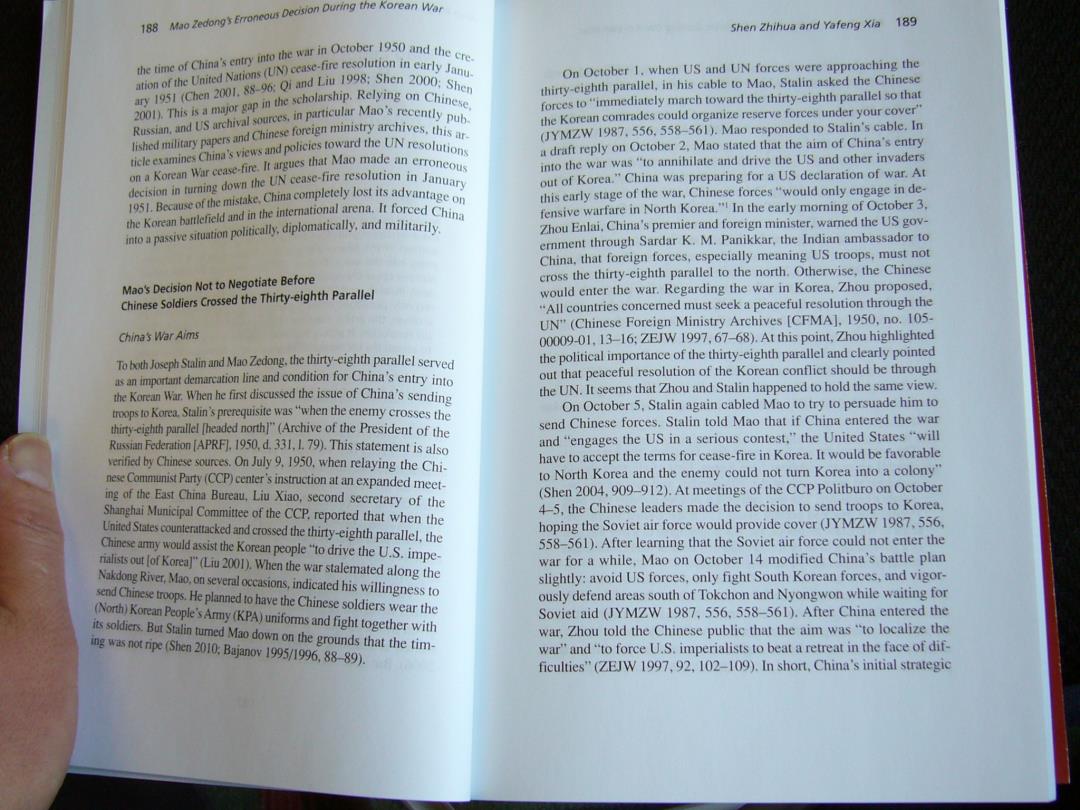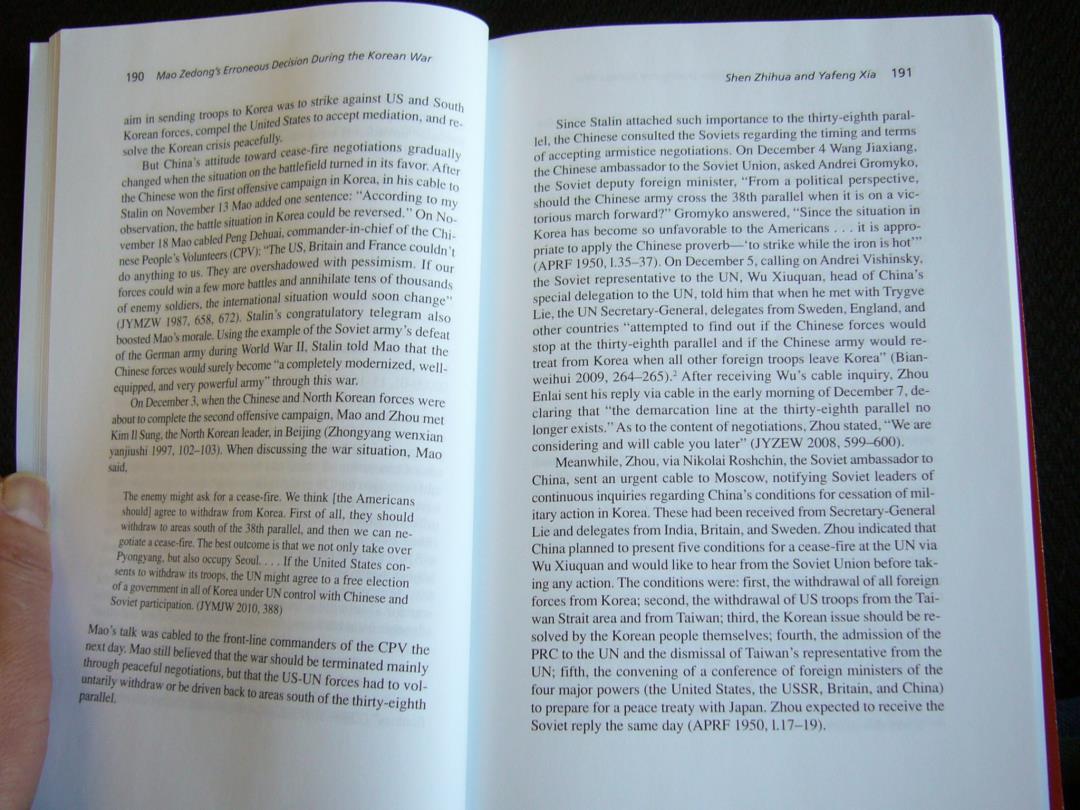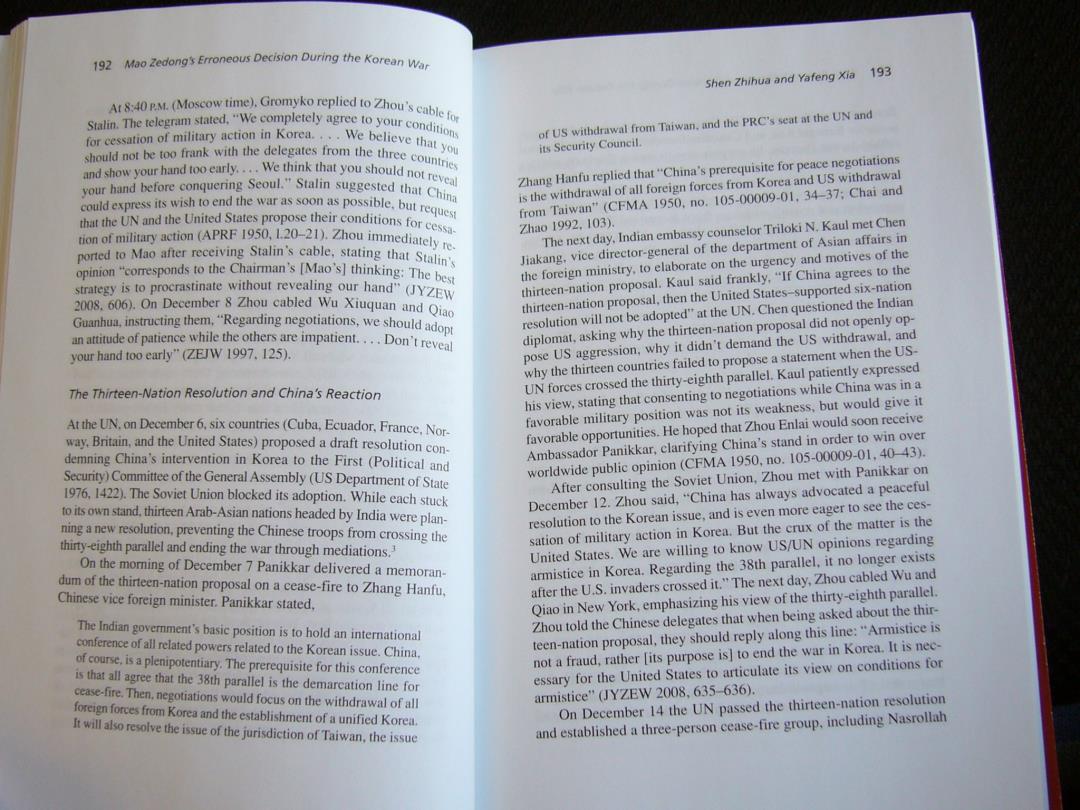
Aar..Apr-June Cuntov Sireet.Boulder.C July-Sept Cet EDITORIAL COMMITTEE 2Send address change Publisher ASIAN PERSPECTIVE Taik-young Hamm (Managing Editor).Cill Lata (Editor).Jong Kun Choi.Jae-Ho Chung.Martin Vol.35 No.2 Apr.-June 2011 Hart-Lamdsbeng.Su-Hoon Lee.Wenhyuk Lim, Chung-in Moon.Kun Young Park.Alvin Y So. Dali Yang ANNLAL SUBSCRIPTION RATES ASSISTANIS TO THE EDITOR Dean J.Ouellette,Heeseon Min.Kelly U.Hur (in headdre above yreAianPerspective Scoul).Julie Boyles (in Portland) em department EDITORAL ADVISORY BOARD revearch centers and commercial,industrial,gov. Peter Hayes、.t aeatal.andgthcgrmultple,cadecrinstituion Samuel S.Kim,Columbia University per year For indivdua the War and Peace Hideo Kobayashi.Wsedany ae peryear and payment mustacc East Asian Peacemaking:Exploring the Patterns of B.C.Koh.University of Illimos,Chicago theaeper yer rdeveryoue of the United Statesadd 1 Conflict Management and Conflict Settlement in East Asia 163 Ma Jisen,Chinese Academty of Social Sciences Andrew Mack.Simon Fraser averiy forinterational postage.All subscriptions Isak Svensson Okonogi Masao,Kelo University neihdceletmmceaccciForqUestionsregaurding please contact journalsrienner.com Mao Zedong's Erroneous Decision During the Korean War: Edward A.Ofsen.Naval Postgraduate School BACK ISSSUES China's Rejection of the UN Cease-Fire Resolution in Richard P Suttmeier,University af Oregon Peter Van Ness,Australian National University For back issues contact joumalsriener com Early 1951 187 Immanoel Wallerstein.State University of Shen Zhihua and Yafeng Xia New York,Binghamtod 2011 by the Institute for Far Eastern Studies. Kyungnam University.All rights reserved.No par The opinions expressed in the articles and review ofthis publication may be reproduced or transmit essayin this joural are those of the contributors ted in any form or by any means(including photo. copying)without the permission of the publisher US Foreign Policy and should not be constnied as representing thase of the Institute for Far Eastem Studies or the edi- naA4N座CTE Authorization to photocopy items for internal or The Change of Public Opinion on US-China Relations 211 personal use is granted by Lynne Rienner Publish. Oingshan Tan This jourl is supported by the National Research es Ine provided that the base fee of 3 perr Foundation of Korea Grant funded by the govern- per copy is paid directly to the Copyright Clearance US Policy Toward Rogue States:Comparing the ment of the Republic of Korea (MEST) Center.27 Congress Street.Salem,MA 01970 USA.For those organizations that have been grant- Bush Administration's Policy Toward Irag and North Korea 239 edphotocopy license by CCC.a separate system Jaechun Kim and David Hundt of payment has been arranged. ASIAN PERSPECTIVE is indexed or abstracted in International Bibliography of the Social Sciences. Regional Issues:Trade and Minorities International Political Science Abstracts.Politicul Science Abstracts,Scopas,Social Sciences Cita- Trade Regionalism in a Realist East Asia: tion Index,and Sociological Abstracts. Rival Visions and Competitive Bilateralism 259 Gregory P.Corning Printed and bound in the United States of America. The paper used in this publication meets the requirements of the American National Standard "Blatant Discrimination Disappears,But.." for Permanence of Paper for Printed Library The Politics of Everyday Exclusion in Contemporary Japan 287 Materials 239.48-1992.69 Bumsoo Kim

Asian Perspective 35(2011)187-209 Mao Zedong's Erroneous Decision During the Korean War: China's Rejection of the UN Cease-fire Resolution in Early 1951 Alinary·revieseed·Original Scho/arshit Shen Zhihua and Yafeng Xia Previous studies of the Korean War have given much attention to the armistice negotiations that started in July 1951.Little has been written of the peacemaking efforts between the time of China's entry into the war in October 1950 and the creation of the United Nations cease-fire resolution in early January 1951.Relying on Chi- nese,Russian,and US archival sources,in particular Mao Zedong's recently published military papers and Chinese foreign ministry archives,this article examines China's views and policies toward the UN resolution.It argues that Mao made an erroneous decision not to accept the UN resolution in January 1951.Because of the mistake, China completely lost its advantage on the Korean battlefield and in Edited by Hvung-Gu Limn the international arena.KErwoRDs:China,Korean War,Mao Zedong. Independently published since 1928 Chinese foreign policy in Korea. Pacific Affairs An Intenational Revie of Aud and the Pacific GETTING INVOLVED IN THE KOREAN WAR WAS THE PEOPLE'S REPUBLIC OF China's(PRC)first attempt to participate in managing international There are few names among academic journals focused on Asia as rich in historyand as evocative affairs and resolving crises on its periphery.But sixty years later.the as Pacifie Affairs We explore contemporary crisis on the Korean peninsula still has not been resolved.It has be- issues that face a complex and interdependent come one of the two toughest security issues for China,along with the Asia.Our international editorial board ensures Taiwan issue.From a historical perspective,it is imperative to re- articles are edited to the highest standard. Pacific Affairs'book reviews are a must for any assess China's policies during the war-in particular.how to make busy scholar or librarian to keep abreast of effective use of both military power and diplomacy in turn and how the latest literature in the field.Please see our to alternate between war and negotiations. website for further details. The Korean War lasted for more than three years,two-thirds of which involved negotiating while fighting.Previous studies have www.pacificaffairs.ubc.ca given much attention to the study of the armistice negotiations that started at Kaesong in July 1951 and continued at Panmunjom (Xia 2006).But little has been written on the peacemaking efforts between 187

188 Mo edong Erroneous Dedsion rn Shen Zhihua and Yafeng Xia 189 the time of China's entry into the war in October 1950 and the cre. ation of the United Narions (UN)cease-fire resolution in early Janu- On October 1.when US and UN forces were approaching the ry 1951 (Chen 2001.8s-96:Qi and Liu 1998:Shen 2000:Shen 宽hteelyn on Chin thirty-eighth parallel,in his cable to Mao,Stalin asked the Chinese RnatSaaeaerNaoenmwpue forces to"immediately march toward the thirty-eighth parallel so that rand Chneivthr the Korean comrades could organize reserve forces under your cover" (JYMZW 1987.556.558-561).Mao responded to Stalin's cable.In kkemg、vemndpsoWteNeoloio a draft reply on October 2.Mao stated that the aim of China's entry orhao me an erroneous into the war was"to annihilate and drive the US and other invaders e the N anuary out of Korea."China was preparing for a US declaration of war.At teChmost itsnageon this early stage of the war,Chinese forces"would only engage in de- theKndi tenforce Chin fensive warfare in North Korea."In the early moring of October 3. vlliplomtically,and miltarily Zhou Enlai.China's premier and foreign minister,wamed the US gov- ernment through Sardar K.M.Panikkar,the Indian ambassador to China.that foreign forces,especially meaning US troops,must not Mao's Decision Not to Negotiate Before cross the thirty-eighth parallel to the north.Otherwise,the Chinese Chinese Soldiers Crossed the Thirty-eighth Parallel would enter the war.Regarding the war in Korea,Zhou proposed, "All countries concerned must seek a peaceful resolution through the UN"(Chinese Foreign Ministry Archives [CFMA].1950,no.105- Chinas War Aims 00009-01.13-16:ZEJW 1997.67-68).At this point,Zhou highlighted MaoZedonthe thirty-eighth parallel served the political importance of the thirty-eighth parallel and clearly pointed eindndofor China's entryinto out that peaceful resolution of the Korean conflict should be through theKre War.When he first discussed the issue of China's sending the UN.It seems that Zhou and Stalin happened to hold the same view. rStin'sprerqe was"when the enemy crosses the On October 5,Stalin again cabled Mao to try to persuade him to hralle heedt(Archive of the President of the send Chinese forces.Stalin told Mao that if China entered the war us Feration [APRF]90.d.331.1.79).This statement is also and "engages the US in a serious contest,"the United States"will dbyChinese soures On July 9 1950.when relaying the Chi- have to accept the terms for cease-fire in Korea.It would be favorable neseCommunist Party (CCP)center's instruction at an expanded meet- to North Korea and the enemy could not turn Korea into a colony" ing of the East China Bureau.Liu Xiao,second secretary of the (Shen 2004,909-912).At meetings of the CCP Politburo on October Shanghai Municipal Committee of the CCP.reported that when the 4-5,the Chinese leaders made the decision to send troops to Korea, United Sates counrked and crossed the thirty-eighth parallel,the hoping the Soviet air force would provide cover (JYMZW 1987.556. Chinese amy would assist the Korean people"to drive the U.S.impe- 558-561).After learning that the Soviet air force could not enter the rialists out of Korea]"(Liu 2001).When the war stalemated along the war for a while,Mao on October 14 modified China's battle plan Nakdong River,Mao.on several occasions,indicated his willingness to slightly:avoid US forces,only fight South Korean forces,and vigor- send Chinese troops.He planned to have the Chinese soldiers wear the ously defend areas south of Tokchon and Nyongwon while waiting for (North)Korean People's Ammy (KPA)uniforms and fight together with Soviet aid (JYMZW 1987,556.558-561).After China entered the itssoldiers But Stalin tumed Mao down on the grounds that the tim- war,Zhou told the Chinese public that the aim was"to localize the ing was not ripe (Shen 2010.Bajanov 1995/1996.88-89) war"and"to force U.S.imperialists to beat a retreat in the face of dif- ficulties"(ZEJW 1997,92.102-109).In short,China's initial strategic

190MaoednnDuring the Korean War Shen Zhihua and Yafeng Xia 191 aim in sending troops to Korea was to strike against US and South ormee t mediion,re Since Stalin attached such importance to the thirty-eighth paral- solve the Korean crisis peacefully. Chinagradually lel,the Chinese consulted the Soviets regarding the timing and terms dhmeahenlhcnaiomomtehatefedRedinisfavorAhe of accepting armistice negotiations.On December 4 Wang Jiaxiang. the Chinese ambassador to the Soviet Union,asked Andrei Gromyko. thehorin his cable to the Soviet deputy foreign minister."From a political perspeetive, S Novmercrin should the Chinese army cross the 38th parallel when it is on a vic- rtaenKore e revrdn No torious march forward?"Gromyko answered,"Since the situation in vemberMP Dun-chiel of the Chi Korea has become so unfavorable to the Americans...it is appro- opleCPVTheU nd Francecou priate to apply the Chinese proverb-'to strike while the iron is hot'" dyTheypesmism Iou (APRF 1950,1.35-37).On December 5.calling on Andrei Vishinsky. rr e nsof thousnd the Soviet representative to the UN.Wu Xiuquan,head of China's ofmthionoudn change special delegation to the UN,told him that when he met with Trygve YMZW197658672).Stalin's congratulatory telegramalso Lie,the UN Secretary-General,delegates from Sweden.England.and nmleofhe Soviet army'defet other countries"attempted to find out if the Chinese forces would ofhedurin World War I.Salinold Mao that the stop at the thirty-eighth parallel and if the Chinese army would re- Chnesecmcompletely modemized,well treat from Korea when all other foreign troops leave Korea"(Bian- equipped,and very powerful army"through this war. weihui 2009,264-265).After receiving Wu's cable inquiry.Zhou o Demt Chinese nd Norh Korean forces were Enlai sent his reply via cable in the early morning of December 7.de- hvecampaign.Mao and Zhou met claring that"the demarcation line at the thirty-eighth parallel no Kmhe North Korean leader.in Beijing (Zhongyang wenxian longer exists."As to the content of negotiations.Zhou stated,"We are y1997.102-103).When discussing the war situation,Mao considering and will cable you later"(JYZEW 2008,599-600). 如过 Meanwhile,Zhou,via Nikolai Roshchin,the Soviet ambassador to China,sent an urgent cable to Moscow,notifying Soviet leaders of The enemy might ask for a cease-fire.We think [the Americans continuous inquiries regarding China's conditions for cessation of mil- houdewithdraw from Korea.First of all,they should itary action in Korea.These had been received from Secretary-General ithrwsouth of the 38th parallel,and then we can ne. Lie and delegates from India,Britain,and Sweden.Zhou indicated that gotiateacfire The best outcome is that we not only take over China planned to present five conditions for a cease-fire at the UN via Pyongyang.but also occupy Seoul....If the United States con- withraw itstoothe UN might agree to a free election Wu Xiuquan and would like to hear from the Soviet Union before tak- of a govemmentnall of Korea under UN control with Chinese and ing any action.The conditions were:first,the withdrawal of all foreign Soviet participation.(JYMJW 2010,388) forces from Korea:second,the withdrawal of US troops from the Tai- wan Strait area and from Taiwan;third,the Korean issue should be re- Mao's talk was cabled to the front-line commanders of the CPV the solved by the Korean people themselves;fourth.the admission of the next day.Mao still believed that the war should be terminated mainly PRC to the UN and the dismissal of Taiwan's representative from the through peaceful negotiations,but that the US-UN forces had to vol- UN:fifth,the convening of a conference of foreign ministers of the niy withdraw or be driven back toareas south of the thirty-eighth parallel four major powers(the United States,the USSR,Britain,and China) to prepare for a peace treaty with Japan.Zhou expected to receive the Soviet reply the same day (APRF 1950.1.17-19)

192Mao ednErroneous Decision During the Korean War Shen Zhihua and Yafeng Xia 193 Stalin.The telegram stated,"We completely agree to your condition oo of atinevthat of US withdrawal from Taiwan.and the PRC's seat at the UN and thould not be kh he co its Security Council. yorandWeyouhuotv hnd hereon ouSalined that Chn Zhang Hanfu replied that"China's prerequisite for peace negotiations ouhthepossible butr is the withdrawal of all foreign forces from Korea and US withdrawal haheUNand the Untd propose thercndn for from Taiwan"(CFMA 1950.no.105-00009-01.34-37:Chai and yt(APRF10-1)Zhou immediatelye Zha01992,103). The next day,Indian embassy counselor Triloki N.Kaul met Chen oedoMaoeren Sualin'be stating that Stain Jiakang,vice director-general of the department of Asian affairs in pds to the Chaiman's [Mao's]thinking:The be the foreign ministry,to elaborate on the urgency and motives of the strategy is to procrastinate without revealing our hand"(JYZEW thirteen-nation proposal.Kaul said frankly,"If China agrees to the 200).On December Zhou cabled WuXiuquan and Qiao thirteen-nation proposal,then the United States-supported six-nation Gunructinthem,Regarding ngotiations,we should adop resolution will not be adopted"at the UN.Chen questioned the Indian tde of patience while theothers are impatient..Don't revea diplomat,asking why the thirteen-nation proposal did not openly op- your hand too early"(ZEJW 1997.125). pose US aggression,why it didn't demand the US withdrawal,and why the thirteen countries failed to propose a statement when the US- The Thirteen-Nation Resolution and China's Reaction UN forces crossed the thirty-eighth parallel.Kaul patiently expressed his view,stating that consenting to negotiations while China was in a At the UN.on December6,six countries (Cuba,Ecuador,France.Nor favorable military position was not its weakness,but would give it way.Britain,and the United States)proposed a draft resolution con favorable opportunities.He hoped that Zhou Enlai would soon receive demning China's intervention in Korea to the First (Political and Ambassador Panikkar,clarifying China's stand in order to win over Security)Committee ofthe General Assembly (US Department of State worldwide public opinion(CFMA 1950,no.105-00009-01,40-43). 1976.1422).The Soviet Union blocked its adoption.While each stuck After consulting the Soviet Union,Zhou met with Panikkar on oitsown stand.thirteen Arab-Asian nations headed by India were plan- December 12.Zhou said,"China has always advocated a peaceful ning a new resolution,preventing the Chinese troops from crossing the resolution to the Korean issue,and is even more eager to see the ces- thirty-eighth parallel and ending the war through mediations. sation of military action in Korea.But the crux of the matter is the United States.We are willing to know US/UN opinions regarding On the moming of December 7 Panikkar delivered a memoran- armistice in Korea.Regarding the 38th parallel,it no longer exists dum of the thirteen-nation proposal on a cease-fire to Zhang Hanfu, after the U.S.invaders crossed it."The next day,Zhou cabled Wu and Chinese vice foreign minister.Panikkar stated. Qiao in New York,emphasizing his view of the thirty-eighth parallel. The Indian government's basic position is to hold an international Zhou told the Chinese delegates that when being asked about the thir- conference of all related powers related to the Korean issue.China. teen-nation proposal,they should reply along this line:"Armistice is of course,is a plenipotentiary.The prerequisite for this conference not a fraud,rather [its purpose is]to end the war in Korea.It is nec- is that all agree that the 38th parallel is the demarcation line for essary for the United States to articulate its view on conditions for cease-fire.Then.negotiations would focus on the withdrawal of all armistice"(JYZEW 2008,635-636). foreign forces from Korea and the establishment of a unified Korea. On December 14 the UN passed the thirteen-nation resolution It will also resolve the issue of the jurisdiction of Taiwan,the issue and established a three-person cease-fire group,including Nasrollah